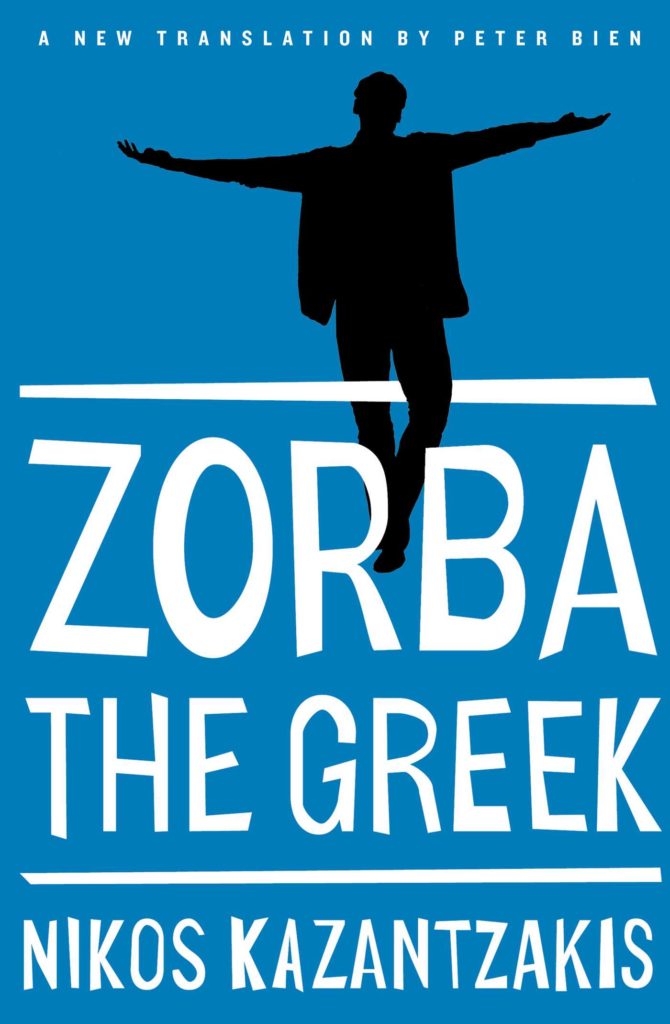
One of the oldest of our mythological dichotomies is between the rational, contemplative Apollonian and the sensuous, emotive Dionysian. In literature, the former are more often brooding melancholics, patterned on Prince Hamlet, while the latter are typically depicted as Falstaffian figures with boundless appetites for wine and women. The Apollonians live in the past or in the future, while the Dionysians live only for the moment. There is also, between the two, an uneven relationship: the Apollonians lament their fate, and look upon the Dionysians with envy, while these lusty revellers are too concerned with the business of living to bother with jealousy. Hamlet can envy Laertes, as he would envy Falstaff, but Sir John would have no patience for the Prince of Denmark. The titular character of Nikos Kazantzakis’ Zorba The Greek is a Dionysian par excellence, a dancing, singing, santuri-playing force of nature, whose raw magnetism makes him admirable to men and irresistible to women.
Our narrator is a self-described intellectual, an aspiring author writing about the life of the Buddha (subtlety is not a quality for Kazantzakis), when he first meets Zorba on the island of Crete, and decides to hire him to help him run a lignite mine. The mining endeavour, though potentially profitable, is not the main aim of our narrator, who is rather “seeking to find some pretext for abandoning [his] papers and throwing [himself] into a life of action.” And as he soon realizes, there could be no better guide to life than Zorba. Asked why he should be hired by the narrator, Zorba disparages the interminable “why”: “Why! Why! Good God, can’t anyone do something without asking why? Just like that! Because you feel like it! So take me as a cook, let’s say. I make amazing soup.” The Apollonian needs a why; the Dionysian does not. “Your excellency holds a scale, eh? You weigh by the gram, eh? Come on, decide! To hell with scales!” The first step towards living life authentically entails dispensing with rationales, and accepting the commensurate loss of control, for good or for ill.
There is little plot to speak of – rather, the narration is propelled by the sheer force of Zorba’s personality, and the narrator’s gradual gleaning of his wisdom. In no area are these lessons more acute than with respect to women, whom Zorba treats as temporary amusements, fit for a momentary delight but no more. “A woman is a refreshing spring,” Zorba tells us:
You bend over it, see your face reflected in the water, drink – you drink, and your bones grate. Afterward comes someone else who thirsts. He bends over in his turn, sees his face reflected, and drinks. After that, still another comes. That’s what it means to be a spring, what it means to be a woman.
This is a view of women advanced by a growing section of the internet, nominally the pick-up artists, who advocate a kind of permanent hedonism, though I also hear notes of the “free love” movement of the 1960s, which viewed monogamy as a form of possession, tantamount to human bondage. In either case, we are far from the Christian conception of love, of “to have and to hold” until death’s inevitable parting. In the book of Zorba, there is no greater mistake in life than to let slip an opportunity to be with a woman, however briefly: “whoever has the chance of sleeping with a woman and does not sleep with her commits a great sin. If a woman calls you to her bed and you do not go, your soul is destroyed!” Is this exaggeration or sound life advice for the terminally Apollonian? We need not fully endorse Zorba’s worldview to recognize the deficiencies in the narrator’s:
My life had taken the wrong path; my contact with fellow humans had ended up as an internal monologue. My degeneration was so great that if I were to choose between loving a woman or reading a good book about love, I would choose the book.
Love may be described in literature, but it cannot be experienced through it, and a life without experiences is indeed impoverished.
Though Zorba is certainly the book’s life force, the narrator deserves special mention as well. Kazantzakis was steeped in Nietzschean thought, and the German’s thumbprint is everywhere visible in this book. In a culminating monologue, for example, the narrator comes to recognize the arid spirituality he has thus far accepted without question, specifically invoking Nietzsche’s concept of the “last man,” seduced into wanting nothing and contenting himself with that:
Everything that had so powerfully seduced me seemed this morning to be the elevated tightrope dance of charlatans. Peoples’ anguish at the end of every civilization always terminates similarly: in technically skilled conjuring tricks, pure poetry, pure music, pure thought, tricks of the “last man” – the one who has orphaned himself from every faith and delusion, who expects nothing any longer, fears nothing any longer, and whose soil has degenerated into spirit so that it no longer offers any place for roots to be buried in order to nourish and be nourished. Humanity has been emptied: no sperm any longer, no excrement, no blood. Every material thing has degenerated into a word, every word into a musical amusement, and now the “last man” sits at the edge of his desert and decomposes this music into mute mathematical ratios.
Writing in the middle of World War II, Kazantzakis could justifiably believe himself to be witnessing civilization’s end, and his narrator is disgusted to recognize the qualities of the “last man” in himself. Against this bloodless creation, Kazantzakis gives us Zorba, all flesh and blood, will and spirit personified, to shame us out of our passivity.